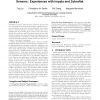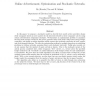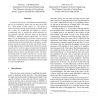163 search results - page 28 / 33 » How Optimal are Wireless Scheduling Protocols |
WICOMM
2010
13 years 5 months ago
2010
The rapid proliferation of wireless systems makes interference management more and more important. This paper presents a novel cognitive coexistence framework, which enables an in...
PERCOM
2009
ACM
14 years 2 months ago
2009
ACM
—Ensuring spontaneous ad hoc interoperation in decentralized ubiquitous computing environments is challenging, because of heterogeneous resources and divergent policies. Centrali...
MOBISYS
2004
ACM
14 years 7 months ago
2004
ACM
ZebraNet is a mobile, wireless sensor network in which nodes move throughout an environment working to gather and process information about their surroundings [10]. As in many sen...
CORR
2010
Springer
13 years 4 months ago
2010
Springer
In this paper, we propose a stochastic model to describe how search service providers charge client companies based on users' queries for the keywords related to these compan...
ICNP
2005
IEEE
14 years 28 days ago
2005
IEEE
In wireless networks, it is well understood what throughput can be achieved by nodes who can hear each other (i.e. nodes within a single cell)[1, 3]. The effects of nodes beyond t...



